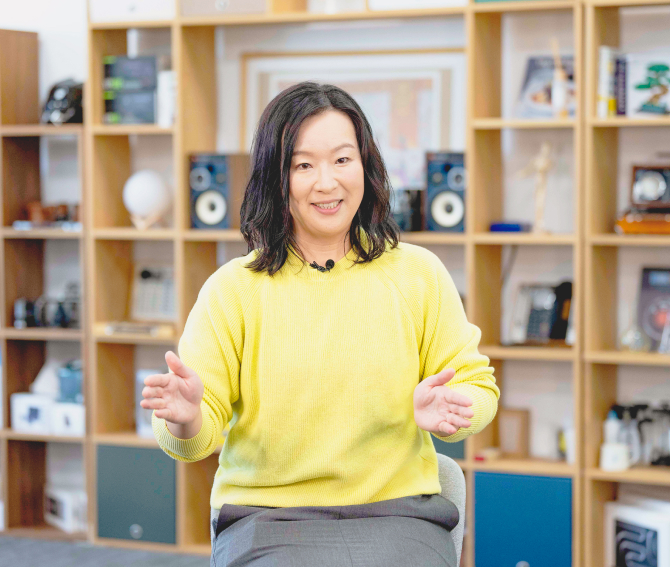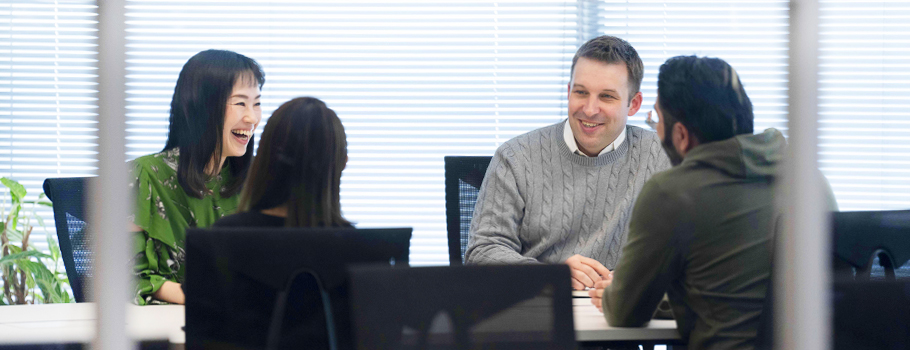LIXIL makes pioneering water and housing products that solve everyday, real-life challenges, making better homes a reality for everyone, everywhere.
- Global Site
-
- English
- Japanese
- Brand Sites
Global
- Global Site
-
- English
- Japanese
- Brand Sites

“During the harvest season, I spend weekends picking apples with my children, and making and labeling the juice. It’s the kind of life I always wanted.”
Yuki Munakata used to live a short distance from Tokyo in Japan’s busy Saitama Prefecture, but applied to move north to Nagano Prefecture and become an area employee – an employment concept in Japan that enables employees to stay within the region they live in. After transferring, Munakata was given permission to work from her new home, balancing her countryside lifestyle with her job at LIXIL. As a result, she was also able to fulfil her dream of raising her children surrounded by nature.

Yuki Munakata designed the award-winning product Vegeterior Outdoor
Munakata benefited from LIXIL’s commitment to employees’ diverse needs and empowering them to fulfill their full potential. The company supported both her return to work, after having children, and her ability to work remotely. Entering a contest in her division for new business ideas was another turning point for her.
“I seized the opportunity and submitted my idea – and I was lucky to be chosen ahead of 500 other entries to take the grand prize,” she recalls.
The win opened the door to a new role in product development and Munakata is currently working on commercializing her idea – an outdoor unit designed for people to both relax and garden – as well as developing a range of others.
Stories such as Munakata’s reflect a fundamental shift in LIXIL and the broader world of work post-pandemic.
Employees want companies that are more flexible and understanding. Businesses are also adopting more holistic approaches to managing the employee experience, signaling an evolving mutual interest between employer and employee.
Human Capital – A Vital Investment
Investing in human capital offers significant individual and company-wide benefits.
According to the McKinsey Global Institute, companies that excel in talent development, internal mobility, and overall organizational health empower employees to increase the value of their own human capital. As a result, 35% of workers1 in companies that focus on both performance and people are likely to move into higher earnings brackets – 1.3 times as many as companies that focus on just performance. In turn, these companies also benefit from operational advantages including talent retention and greater organizational resilience.
Creating inclusive and empowering workplaces also drives innovation and delivers financial benefits. According to organizational consultants Korn Ferry, companies that score in the top quartile for engagement see twice the net profit and 2.5 times the revenue growth2 of those with lower scores. And almost 60% more of those companies’ employees say their role brings out their most creative ideas.

LIXIL’s People Strategy makes up the heart of its approach to human capital management. In order to transform the company into a more innovative and inclusive community where employees are empowered, it focuses on three core pillars: embedding inclusion in the organization’ s DNA; elevating talent through a culture that facilitates innovation; and enhancing the overall employee experience.
Pursuing Growth Through Innovation
Establishing a framework to foster bottom-up innovation is one defining feature of companies with successful human capital management strategies. Empowering employees to lead the development of ideas they have come up with helps drive talent development and engagement while contributing to the future success of the business.

Julia Deister, the CEO and co-founder of Hydrific
Julia Deister's journey at LIXIL exemplifies the power of this approach. She joined the company on a three-year work program while studying for her bachelor’s degree. Over the next decade, Julia was given the opportunity to take on leadership roles and spearheaded some global initiatives. She now serves as the CEO and co-founder of Hydrific , a LIXIL venture at the forefront of developing innovative solutions to make water conservation easy and enjoyable. Hydrific's flagship product, Droplet, is a smart home sensor that monitors real-time water usage, detects leaks, and discovers new insights.
Hydrific was born after the company’s Tuck-LIXIL program3 identified water sustainability solutions as an area where new business ideas could create positive change. LIXIL CEO Kinya Seto is an alumni of Tuck Business School, and the two organizations collaborated to create a common language and framework around innovation for hundreds of senior executives and leaders across the business. Alongside a range of ideas becoming incubation projects, this has led to increased collaboration and new ways of thinking within LIXIL.
Deister’s route to founding Hydrific took in multiple promotions and milestones including becoming one of LIXIL’s youngest managers. And she shows no signs of slowing down.
“I am on a continuous learning curve, filled with diverse opportunities and challenges that contribute to my professional and personal growth,” she says.

Miho Fujiwara (right) designed Nyanpeki, a modular and magnetic play wall for cats
Miho Fujiwara, meanwhile, joined LIXIL as a fresh-out-of-school engineer and spent a few years building product development and design skills before creating a new business idea – a modular, magnetic play wall for cats . Originally sold in limited quantities, demand soon outstripped targets, and it is now available to the public and supported by its own set of fans4.
Fujiwara says that the systems in place to empower everyone to do their best work at LIXIL helped her get to where she is today: “It’s very important to have an environment where you can express your opinions and hear the opinions of others. Through that kind of communication, you grow.”
Diversity, Inclusion and the Employee Experience
Underpinning all of this work is a clear corporate purpose – to make better homes a reality for everyone, everywhere – and three LIXIL Behaviors : Do the Right Thing, Work with Respect, and Experiment & Learn. Together, they form a common foundation to unite diverse employees across the globe and empower them to innovate together.

Rie Chikaishi, a team leader in the Marketing Planning Department
At the same time, the characteristics that make up individuals are just as important. Diverse teams have repeatedly been shown to be more innovative5 and make better decisions. But diversity alone cannot thrive without inclusion. To this end, LIXIL is working to make the company “a home for everyone”, where ideas flourish and people can get the value they want from their careers while living the lives they want to.
For some, such as Rie Chikaishi, a former executive assistant who now leads a team in the Marketing Planning Department, being able to work remotely was a big factor in her returning to work full-time after the birth of her third child.

Kenji Kusakawa, product manager of SHIN-ON
For others, like Product Manager and violinist Kenji Kusakawa, it is about taking advantage of flexible working styles. His role has included developing SHIN-ON, a new U-shaped shower head that can envelop the entire upper body in water and help warm one to the core, while being able to work different hours on days when he has to practice or has a concert in the evening.
LIXIL’s own research demonstrates the appetite for this kind of flexibility from today’s workforce. In a survey of its employees in Japan, the overwhelming majority of people across all age groups said they wanted to continue with a “remote-based working style”.
Shape the Future of Living (video):
Building Futures
Building human capital has been described as “the single most effective way of promoting rapid social and economic growth and distributing its benefits more fairly”6 by the World Economic Forum.
LIXIL has robust diversity and inclusion targets to support its work in this area, including pushing its 31.3% ratio for female/male board and executive officers to 50:50 by FYE2030, as well as having women in 30% of all managerial positions globally. And it employs a suite of tools alongside, such as a dashboard that helps leaders monitor progress and training for managers to support them in becoming coaches for their teams. During FYE24, approximately 6,000 managers globally have participated in manager-led training to activate D&I in their teams, and in FYE23 the company started to see an uptick in the inclusion score of its female non-managerial employees. Ultimately, through this work, the company is aiming to become more representative of the customers it is serving.
As Julia Deister adds: “At LIXIL, people are given chances based on their merits, not on preconceived notions of who they should be. I know it strengthened my leadership mindset and allowed me to grow quickly.”
Whether it’s through helping employees come up with innovative new ways to live with our pets or to devise new products while harvesting apples with family, investing in human capital is a crucial aspect of ensuring LIXIL is agile and innovative enough to take on future challenges. This way, it believes, it will continue to deliver a strong financial performance while contributing to society and the planet.
Our Stories
- Backing People and Passions to Drive Innovation
- How Toilets in Schools are Catalyzing Change in Communities
- Building the Future by Recycling the Past
- Reinventing Consumer Connections in the World's Largest E-commerce Market
- Tackling Household Water Inefficiency in a Water-Stressed World
- Plugging the Plumber Shortage
- Pioneering Solutions to a Sewage Crisis in Rural Alabama
- Meet the Citizen Developers Changing How We Work
- Design and Brand Identity Transformation at LIXIL
- Three Changes to Prepare Europe’s Sanitary Industry for Growth
- Three Steps to Creating an Inclusive Culture
- From Linear to Circular: Giving Products in Your Home a New Lease of Life
- Crafting Unique Experiences as well as Products
- GROHE X: A Digital Brand Experience
- Design-led Innovation Delivering True Value
- Responsible Use of Plastics
- Empowering our People for an Agile Future
- Turning the Waves of Change into Opportunities
- SATO Tap: a New Handwashing Solution for All
- New Ways of Working Take Flight at LIXIL
- INAX: Rituals of Water
- Refreshing our sanitation targets, standing firm on our commitments
- Developing Attractive and Differentiated Products
- Conserving Water: The New Normal
- Insulating For a Warmer and Healthier Home
- Open Kitchen, Open Communication
- Tackling Open Defecation in India
- Shaping the Future of Faucets, One 3D Layer at a Time
- Bathed in Culture and Tradition
- Remodeling the Housing Market
- LIXIL's AQUA CERAMIC makes bathroom stains a thing of the past
- The Technology of Water
- Tackling Challenges in Global Sanitation and Hygiene
